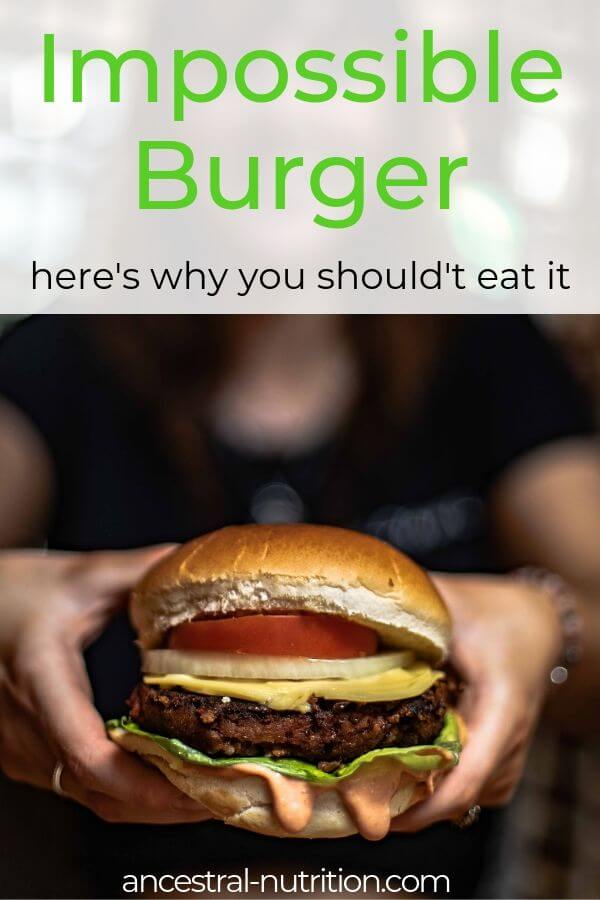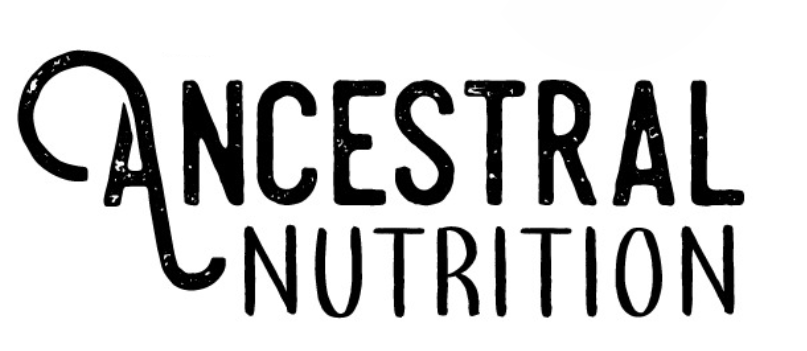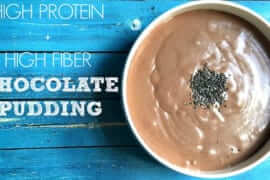After writing about Beyond Meat, I figured it was time to pull the plug on the Impossible Burger. Because when it comes down to it, the reality is that the ingredients in the Impossible Burger have been linked to serious health issues and environmental damage. When did food grown in a lab become everyone’s idea of health food? When did it become sustainable? We have become so detached from our food, how it was grown and who grew it. It truly represents how disconnected from nature our society is.
While the intention behind the Impossible Burger may be good, and I’m sure it is, the reality is that this is not food. This is not environmentally friendly. This is not sustainable. This is not health or nutrition. And let me explain why.
First, let’s take a look at the ingredient list.
Full Ingredient List:
Water, Textured Wheat Protein, Coconut Oil, Potato Protein, Natural Flavors, 2% or less of: Leghemoglobin (Soy), Yeast Extract, Salt, Konjac Gum, Xanthan Gum, Soy Protein Isolate, Vitamin E, Vitamin C, Thiamin (Vitamin B1), Zinc, Niacin, Vitamin B6, Riboflavin (Vitamin B2), Vitamin B12
Now, let’s examine these ingredients.
Leghemoglobin (Soy)
Soy leghemoglobin is not a relatively new “food,” it’s brand spanking new. Created exclusively for the Impossible Burger to mimic the taste and texture of a traditional meat based burger. Humans had not eaten this genetically modified ingredient until the good ol’ food scientists at Impossible Burger created it.
From an internal FDA document,
“The current arguments at hand, individually and collectively, were not enough to establish the safety of SLH for consumption,” an FDA memo said, referring to soy leghemoglobin, a protein found in soy roots that’s the basis for the burger’s meaty texture and flavor. Source
Then I found this study published in April of this year essentially stating the soy leghemoglobin was safe in rat trials.
While the company insists soy leghemoglobin is safe because atom-for-atom it is identical to heme, this isn’t entirely true. Impossible Burger routinely states that soy leghemoglobin is the exact same as heme and this is simply false. Heme is naturally occurring in meat, it is not genetically modified. It’s simply not possible to re-create something nature made in a lab and call it identical. And that’s an important distinction because even with the above study, we really have no idea what the long-term effects of this entirely new “food” are. One of the biggest issues with SLH is that no long-term studies exist to establish its safety.
Keep in mind that the above study,which Impossible Burger uses to tout the safety of soy leghemoglobin, was a 28 day trial on rats. It was not a long-term trial on humans. And my God why are we creating food that needs clinical trials to establish safety?
Yeast Extract
The soy leghemoglobin is produced using a genetically modified yeast. Aside from the argument of whether or not we should be consuming genetically modified food,
The FDA also noted that the company’s engineered yeast doesn’t just produce leghemoglobin—it also produces 40 other normally occurring yeast proteins that end up in the burger, which “raises further question on how the safety argument could be made based solely on SLH.” Source
This method of producing SLH produces 40 yeast proteins in the burger. Though due to labeling standards, only yeast extract is required to be on the label.
As a nutritionist, I personally recommend people void most yeasts, particularly those with gut issues (which is most people). Yeast feeds pathogenic bacteria and can negatively impact gut microbiota. Regular consumption of yeast products can lead to a host of GI issues including fungal overgrowth, IBS, food intolerance and many more. Keep in mind that most people consume yeast everyday in bread, pizza, pastries and now, 40 different types of it in the Impossible Burger.
Soy Protein Isolate
Soy protein isolate (SPO) is a highly processed food byproduct. It’s really not even food. Let’s chat a bit about how it’s made.
First, soy oil is separated from the soybean using hexane extraction. Wondering what hexane is? A neurotoxin.
After that, the protein is soaked in ethanol or an acidic bath. Consider for a second how a bean that’s green ends up as a fine, white powder (or a piece of fake chicken for that matter). It is bleached, deodorized and undergoes an extreme amount of processing. This is not health food, it’s not even food.
Soy consumption has been shown to reduce sperm concentration (source, source), exacerbate thyroid issues (source, source), has been linked to breast cancer growth (source, source) and has been linked to breast development in two year-old girls (source).
I don’t vilify all soy. I think organic, well sourced soy in the form of miso or tempeh is fine from time to time – which is how Asian cultures used to eat soy before soy exploded all of the world as a commodity crop. Now, soy is over 90% genetically modified.
Soy becomes an issue when used as a protein source as opposed to a condiment or occasional serving. Majority of Americans consume a massive amount of soy; it’s found in almost all junk food. Soy flour, soy lecithin, soy protein isolate, soy oil – soy is so cheap and subsidized by the US government, which is why it has made it’s way into the daily diet of Americans.
Textured Wheat Protein
Textured wheat protein is a highly processed alternative to meat. And I have a lot of issues with wheat – mainly that it’s difficult, if not impossible, for everyone to digest and also that it’s not a nutrient dense food. It’s inflammatory, it irritates the gut lining. And there is nothing in wheat that cannot easily, more readily and more gently be obtained from healthier options. Not one single thing.
Beyond that, wheat is high in phytic acid, which further prevents nutrient absorption (source). Gluten, the protein in wheat, has been linked to anxiety, depression, schizophrenia, seizure disorders and ADHD (sources can be found here).
How These Ingredients Are Bad For The Environment
Many people think that just because something is plant based, it’s good for the environment. Or at the very least, isn’t harmful to the environment. This could not be further from the truth. Modern agriculture is one of the driving factors causing environmental damage. Large scale monocopping operations, like those that grow soy, corn, canola and wheat, are doused in chemical fertilizers that enter local waterways, making their way to the Gulf of Mexico, causing a dead zone the size of Rhode Island.
And while the meat industry is blamed for this, they are not alone in sharing the blame. Much of the soy and corn is grown for animal consumption – and much is grown for vegetarians as well. You cannot blame the meat industry alone if you also consume these crops. Don’t get me wrong, the meat industry is also to blame and by no means should livestock even be fed these crops – they should be on grassland. But Americans eat a vast amount of soy, as do vegetarians. And if you’re consuming soy, you’re contributing to this environmental destruction.
What many people don’t realize is that land and animals have a symbiotic, healthy relationship if properly grown. If livestock are put out to pasture, eating grass (not soy, corn or wheat), their manure literally feeds the land. Soil needs to be fed to remain healthy. These plant based staples destroy the land, they utilize the nutrients in the soil until there are none left. They are sprayed with chemical fertilizers which further depletes the soil. This is now how it should be done.
Pasture raised animals nourish the land and soil, allowing for healthy plants to grow. Monocropping operations use a vast amount of water, fertilizers and natural resources. A farm like Polyface uses land management, environmental practices and grows healthy, humane animals as well as a plethora of vegetables. This is how farming is meant to be done.
If you want to be an environmentally conscious consumer, buy real, whole, local food. Buy organic vegetables at your local farmers market. Buy produce that is in season. Buy locally, the less your food traveled, the healthier it is and the less gas and emissions are used. Grow your own garden. These are the practices that will make a huge impact on our environment, not lab grown fake meat.
Additional sources to read on this topic: The Vegetarian Myth, Meat: A Benign Extravagance, Folks, This Ain’t Normal
A word on GMOs.
First, many people actually have no idea what genetic modification is and will comment saying, “Genetic modification has been going on for thousands of years!” No, it’s hasn’t. What you’re thinking of is called hybridization. Hybridization occurs naturally and involves plant breeding. Farmers have been hybridizing plants for thousands of years to make them more palatable, heartier and strong. They do this with no high tech equipment because mother nature allows them to do so, and does so herself, often without the help of any human intervention at all.
Genetic modification is an entirely different ballgame that involves genetic manipulation using advanced biotechnology. It usually involves splicing the genes of two entirely different species and would never occur in nature.
I contacted Impossible Burger directly to ask if their soy is genetically modified. They politely told me that it is not – and neither is their wheat or potatoes. I thought this was odd because there is no commercially available genetically modified wheat. There are next to no GMO potatoes available (source).
So it makes me think that the person who told me the soy was GMO-free actually might not know what she was talking about. I’m not saying they use GMOs, but it’s odd to me that I was told other items are GMO-free, when of course they are. There’s really no available GMO counterpart. It’s kind of like labeling water as gluten-free.
In closing…
Let me emphasize this fact that many people missed when reading my article on Beyond Meat products: I do not in any way promote, recommend or endorse the modern industrial system of animal agriculture. I do not encourage anyone or personally purchase meat from factory farms. I exclusively recommend and consume sustainably, responsibly and humanely raised animals from my locals farmers – and I have many. I have made friends with these people. They treat their animals and their land with love. They are connected to nature in a way that the vast majority of people are not – particularly those consuming vegan food grown in a lab and calling it sustainability. This is not food, this is not health, this is not environmental sustainability.





